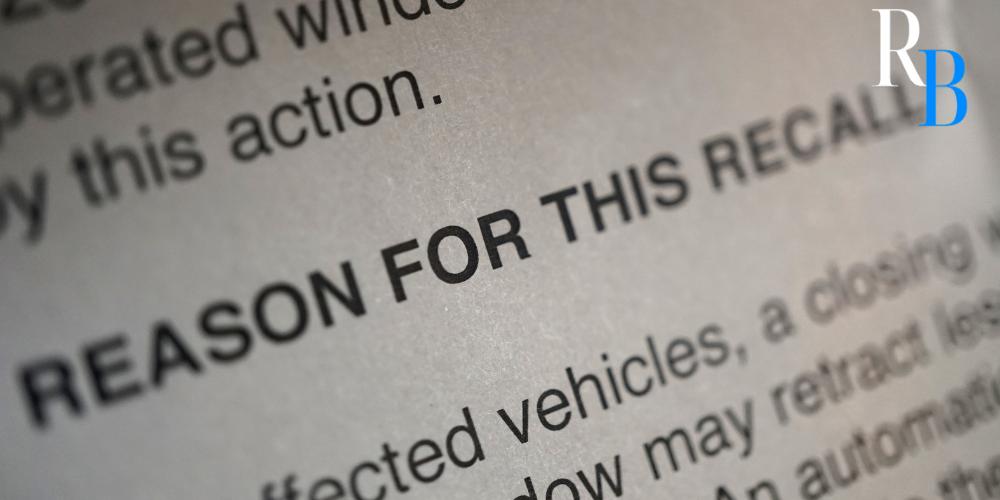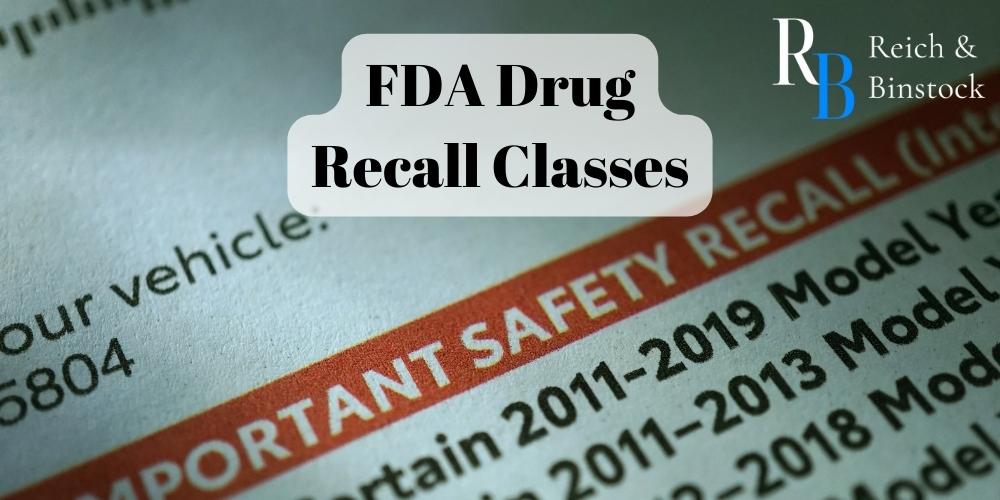Drug recalls are, sadly, quite common in the United States. The U.S. Food and Drug Administration (FDA) records show that such events occur once a week. It can be downright frightening when it happens to the prescription you are taking, especially if you rely on it to remain alive. You may be wondering what you should do when such an issue occurs. In this post, we answer, “Do all drug recalls need to be taken seriously?”. Different drug recall classes exist, which we also cover.
Not all medication recalls are of equal urgency. Some recalls happen because of labeling issues. However, others occur due to medication mix-ups or because patients have adverse reactions that could be life-threatening. If you have been adversely affected by a dangerous drug, contact the Houston product liability lawyers at Reich & Binstock as soon as possible. Call our office at 713-622-7271 to schedule your free consultation.
What Are FDA Recalls?
An FDA recall occurs when a product regulated by the U.S. Food and Drug Administration (FDA) is removed from the market or corrected because it violates laws enforced by the FDA. These recalls are conducted when there is a risk to public health or safety posed by the product. Recalls can be initiated by the FDA itself or by the manufacturer or distributor of the product. The FDA handles recalls of pharmaceuticals, medical devices, and other products.
How Do FDA Drug Recalls Work?
The primary goal of FDA drug recalls is to protect the public by addressing potential health risks associated with pharmaceutical products and ensuring that safe and effective medications are available in the market. The FDA can initiate a recall, or a company can initiate a voluntary recall of its own product.
What Is the FDA Drug Recall Process?
Identification of Problem: The need for a drug recall can arise for various reasons, such as contamination, manufacturing defects, labeling errors, or safety concerns. Sometimes, reports of adverse events or consumer complaints prompt investigations leading to a recall.
Recall Classification: The FDA determines drug recall classes based on the severity of the potential health risks associated with the product.
Initiation of Recall: If a company discovers an issue with its drug, it may voluntarily recall the product. They must notify the FDA about the recall action and work with the agency to determine the classification and recall strategy.
FDA’s Role: The FDA evaluates the recall strategy proposed by the manufacturer and assesses its adequacy. They monitor and oversee the recall process to ensure it is effective and that appropriate actions are taken to protect public health.
Communication to the Public: Once a recall is initiated, the FDA informs the public about the recall through press releases, postings on the FDA website, and other communication channels. The FDA provides information about the reason for the recall, the potential risks, and guidance to consumers on what steps to take.
Removal or Correction of Product: Depending on the recall classification and the severity of the issue, the product might be removed from the market entirely or corrected to address the problem.
Follow-Up: The FDA monitors the effectiveness of the recall and ensures that the recalled products are appropriately disposed of or corrected. They may also conduct investigations and inspections to prevent similar issues in the future.
What Is a Partial Recall?
A partial recall, in the context of product recalls, refers to a situation where only a specific portion or certain units of a product are being recalled rather than the entire batch or production run. If only certain batches of a product are affected by adverse events, this is when the FDA may issue a partial recall.
A partial recall allows companies to target and address the specific issue while minimizing disruption to consumers and the market for unaffected products. However, it’s crucial to effectively communicate to the public which specific units or batches are being recalled and provide clear guidance on actions consumers should take to ensure their safety or replace affected products.
Drug Recall Classes

There are different drug recall classes. The most serious of all types are Class I ones. The FDA places any dangerous or defective prescription drugs that have the potential to cause serious health problems or death in this class.
Class I Recalls
A Class I drug recall is the most serious type of recall issued by the U.S. Food and Drug Administration (FDA). It signifies a situation in which using or being exposed to the recalled drug product is highly likely to cause serious adverse health consequences or even death.
Class II Recalls
A class II recall is the most common. The FDA places any prescription drugs that it believes may cause a patient to suffer from a temporary health hazard into this recall category. Federal officials believe that these types of drugs only pose a small risk of adverse health consequences for patients.
Class III Recalls
A class III recall is the least serious of all recalls. The FDA places any prescription drugs that violate FDA manufacturing or labeling regulations into this recall category. Federal officials believe that these drugs are unlikely to cause a patient to have an adverse health response.
How to Search for Recalled Drugs
There are several ways someone can search for recalled drugs to check if a medication they are using or considering using has been recalled.
- FDA Website: The U.S. Food and Drug Administration (FDA) maintains a searchable database of drug recalls on its website. You can visit the FDA’s Drug Recalls page and search for specific drugs by name, active ingredient, manufacturer, or recall reason. The database provides details about the recalled product, including the reason for the recall, recall classification, and instructions for consumers.
- Medication Guides and Labels: Check the medication packaging or the leaflet that comes with the drug for information about any recent recalls. Manufacturers typically provide instructions or contact information in case of a recall.
- Pharmacy or Healthcare Provider: Your pharmacist or healthcare provider might also have information about drug recalls. They can assist in checking the status of a particular medication and provide guidance on what to do if a drug has been recalled.
- FDA Alerts and Notifications: The FDA regularly issues alerts, press releases, and updates regarding drug recalls. Subscribing to FDA alerts or newsletters can inform you about recent recalls and other safety-related information.
- Online Databases and News Sources: There are websites and online resources dedicated to health news and drug safety that might provide updated information about drug recalls. Reputable news sources often cover recalls, providing details and guidance to consumers.
How Do Patients Get Notified of Recalls?
The U.S. Food and Drug Administration (FDA) issues public notifications about drug recalls through press releases, postings on its website, and updates on social media platforms. Patients can access this information directly from the FDA’s website or subscribe to FDA alerts to receive notifications via email or RSS feeds.
Pharmacies play a crucial role in notifying patients about drug recalls. They may directly contact patients who have obtained the recalled medication, advising them to return the product or providing alternative medication. Healthcare providers may also communicate recall information to their patients during appointments or through patient portals.
Manufacturers typically issue recall notices on the medication’s packaging or include information in the medication guide. Patients should carefully read labels, leaflets, or any inserts provided with their medication for recall notices.
What to Do If Your Medication Was Recalled

You may feel tempted to immediately stop taking your medication if you learn that it has been recalled. However, this is not always the best decision. Don’t make any decisions about your medication until you contact your doctor.
Gather Information
Keep updated about the recall by checking for any new information or updates from the FDA, the manufacturer, or reliable sources. Information might include details about the reason for the recall, potential health risks, and steps to take for safe replacement or alternatives. You can also contact the drug’s manufacturer or the FDA directly.
Find the Lot Number
Many drug recalls concern only certain batches of medication rather than the medication as a whole. Carefully read the official recall announcement to find the affected lot numbers either on the FDA’s website or the manufacturer’s website. Next, look at your medication packaging to see if your lot was affected by the recall.
Depending on the type of packaging, you can find the lot numbers in the following locations.
- Bottles and vials: The lot number should be printed next to the expiration date, by the barcode, or under the dosing instructions.
- Blister packs: The lot number should be printed on the backing where you would normally push the pill through.
- Cream and gel tubes: The lot number should be printed above the crimped end of the tube or on the back with the storage information.
- Pharmacy containers: To find your lot number when you’ve gotten your medication from the pharmacy, you may need to call the pharmacy to find the lot number. They keep records of which lots they used, so they can tell you if your medication was recalled.
Properly Dispose of the Medication
Return the recalled medication to the pharmacy or follow the specific instructions provided in the recall notice. Many pharmacies accept recalled medications and provide replacements or refunds.
Contact Your Healthcare Provider
Reach out to your healthcare provider or pharmacist for guidance. They can offer advice on alternative medications or treatments and help address any concerns or questions you may have regarding the recall.
Does a Recall Mean a Company Is Liable for Damages?
A recall itself doesn’t automatically imply liability on the company’s part for damages. However, a recall might be an indication that there’s a potential issue or risk associated with a product, which could lead to legal implications and liability for damages, depending on the circumstances.
The liability of drug manufacturers for damages resulting from a recalled product would depend on various factors.
- Product Defect or Negligence: If the recalled product is found to have a defect or if the company was negligent in the manufacturing, labeling, or distribution process, it might be held liable for damages caused by the product.
- Failure to Warn or Provide Adequate Instructions: If the company fails to provide proper warnings about potential risks or doesn’t offer adequate instructions for the safe use of the product, it might be held responsible for resulting damages.
- Consumer Harm: If consumers suffer harm, injury, or financial losses from using the recalled product, they might pursue legal action against the company to seek compensation for damages.
- Evidence and Causation: Proving causation between the use of the product and the damages suffered is crucial in establishing liability. Plaintiffs would need to demonstrate that the use of the product directly resulted in the harm or damages they experienced.
Companies that initiate recalls voluntarily or in cooperation with regulatory agencies, take prompt action to address issues, and mitigate risks may demonstrate responsible behavior. However, recall situations can lead to legal challenges, lawsuits, or settlements if consumers suffer harm from the recalled product.
Contact a Defective Drug Lawyer with Reich & Binstock Today
Recalls are tricky. You may put your health and life at risk if you continue taking a recalled prescription drug. You may suffer serious health implications or die if you do stop taking it, though. We recommend that you contact your doctor if federal regulators or manufacturers recall the prescription drug that you’re taking. They can advise you whether to discontinue taking your prescription drug or switch you to something different that may be safer.
If you have experienced an adverse reaction or complication due to taking a drug recall, then you may be entitled to monetary relief. The amount of financial compensation you may be eligible to receive will be contingent upon the harm that you suffered from taking the drug. An experienced drug injury attorney will want to learn more about what happened to you before advising you on what legal action you should take in your case.
Schedule a free consultation with us by calling 713-622-7271 today or by submitting an online intake form.














